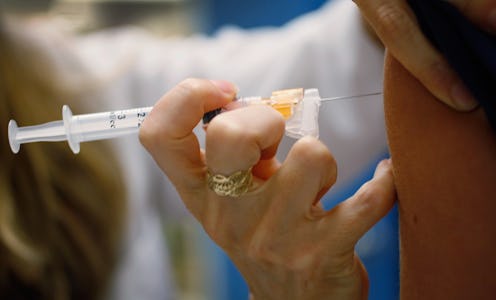News
How Anti-Vaxxers Are Affecting 'Herd Immunity'
As if you needed another reason to distrust anti-vaxxers: Thanks to the many, many unsubstantiated claims that vaccines cause everything from autism to SIDS, the anti-vaccine movement has had some very substantiated consequences — including "herd immunity," which is being steadily chipped away by anti-vaxxers. "Herd immunity" is defined in several different ways, but any way you define it one thing is clear: herd immunity is a good thing, unless you're OK with measles and diphtheria outbreaks every now and then. Because when vaccinations dip below the herd immunity threshold, that's exactly what happens: the risk of outbreaks rise significantly.
A 2013 report in Scientific American revealed that opting out of vaccines causes certain states, from New York to North Carolina, to dip below "herd immunity." In other words, if one child gets infected with a disease in a population that's below the herd immunity threshold, it won't be a matter of Billy's going to stay home from school until he gets better — the entire town will be staying home for a while.
So the issue is no longer about the individual's right to choose what's best for their child. In the event of an outbreak, the infectious disease won't just target the unvaccinated — vaccinated children and adults with weak immune systems and babies who are too young to be vaccinated will also get sick.
Scientific American's chart shows that between 2006 and 2011, the herd immunity threshold for diphtheria, tetanus, and pertussis (whooping cough) in children ages 19-35 months has dropped in more than half of the country. Some of the states that saw the largest drops in herd immunity were South Dakota, North Carolina, Missouri, Oregon, South Carolina, Delaware, and New York. As of 2011, 49 states were below the herd immunity threshold for whooping cough. In 2012, the U.S. experienced the largest whooping cough outbreak in 50 years.
According to Dr. Kimberly Shea , Assistant Professor of Epidemiology at the Boston University School of Public Health, measles is another disease likely to see an outbreak. In 2010, an unvaccinated 7-year-old boy came back from a trip to Switzerland, where he had been infected by the measles-causing rubella virus. He went back home to San Diego, where vaccination rates were high at the time, and infected 11 people. The message is this: Even when herd immunity is strong, unvaccinated people still pose a threat.
Dr. Shea suggested the biggest influence over the opt-out trend is misinformation about vaccine risks and the seriousness of the diseases that vaccines are intended to prevent. "Be wary of unfounded claims about vaccinations and obtain your information from a trusted and reliable source like your health care provider or pediatrician," she told the Boston's 90.9 WBUR radio station.
And by trusted and reliable source, she probably doesn't mean Jenny McCarthy, who is just one of several celebrities championing the anti-vaccine movement. The movement is largely based on the theory that vaccines for measles, mumps and rubella cause autism, and although said theory has been debunked, the movement is still going strong.
If you're just catching up to this feud now, or if you're still on the fence regarding vaccines (for shame), here is a breakdown of the key points from both sides, the "Anti-Vaxxers" and that thing called science.
The Anti-Vaxxers
- Vaccines cause autism, based on this 1998 study by Andrew Wakefield (oh look — it's been retracted).
- The presence of thimerosal, a mercury-containing preservative, makes vaccines toxic.
- The hepatitis B vaccine causes multiple sclerosis.
- There is a link between certain vaccines and SIDS (sudden infant death syndrome).
Science
- There is no scientific evidence that shows any form of link between vaccines and autism.
- The level of thimerosal in vaccines is strongly regulated and meets the requirements for safe use while effectively protecting against pathogens.
- Numerous studies have shown no link between the hepatitis B vaccines and multiple sclerosis, and in fact, researchers do not recommend delaying the vaccine until more is known (because the evidence is overwhelming already).
- The Institute of Medicine studied possible relationships between SIDS and individual vaccines diphtheria-tetanus-whole-cell pertussis (DTwP), DTaP, HepB, Hib, and polio, as well as specific combinations of vaccines. The evidence does not support the theory that vaccines cause SIDS.
Images: Center For Disease Control
